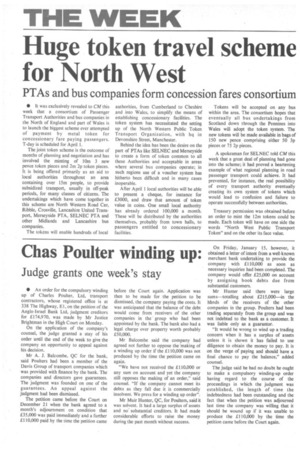Chas Poulter winding up:
Page 16

If you've noticed an error in this article please click here to report it so we can fix it.
Judge grants one week's stay
• An order for the compulsory winding up of Charles Poulter, Ltd, transport contractors, whose registered office is at 338 The Highway, El, on the petition of the Anglo-Israel Bank Ltd, judgment creditors for £174,970, was made by Mr Justice Brightman in the High Court on Monday.
On the application of the company's counsel, the judge granted a stay of his order until the end of the week to give the company an opportunity to appeal against his decision.
Mr A. J. Balcombe, QC for the bank, said Poulters had been a member of the Davis Group of transport companies which was provided with finance by the bank. The companies and directors gave guarantees. The judgment was founded on one of the guarantees. An appeal against the judgment had been dismissed.
The petition came before the Court on December 21 when the bank agreed to a month's adjournment on condition that £35,000 was paid immediately and a further £110,000 paid by the time the petition came before the Court again. Application was then to be made for the petition to be dismissed, the company paying the costs. It was anticipated that the balance of the debt would come from receivers of the other companies in the ' group who had been appointed by the bank. The bank also had a legal charge over property worth probably £.50,000.
Mr Balcombe said the company had agreed not further to oppose the 'making of a winding up order if the /110,000 was not produced by the time the petition came on again.
"We have not received the £110,000 or any sum on account and yet the company still opposes the making of an order," said counsel. "If the company cannot meet its debts as they fall due it is commercially insolvent. We press for a winding up order".
Mr Muir Hunter, QC, for Poulters, said it was solvent. It had a large surplus of assets and no' substantial creditors. It had made considerable efforts to raise the money during the past month without success. On Friday, January 15, however, it obtained a letter of intent from a well-known merchant bank undertaking to provide the company with £.110,000 as soon as necessary inquiries had been completed. The company would offer £25,000 on account by assigning book debts due from substantial customers.
Mr Hunter said there were large sums—totalling about £215,000 in the Ithnds of the receivers of the other companies in the group. Poulters had been trading separately from the group and was not indebted to the bank as a customer. It was liable only as a guarantor.
"It would be wrong to wind up a trading concern when it has a surplus of assets unless it is shown it has failed to use diligence to obtain the money to pay. It is on the verge of paying and should have a final chance to pay the balance," added counsel.
The judge said he had no doubt he ought to make a compulsory winding-up order having regard to the course of the proceedings in which the judgment was established, the length of time the indebtedness had been outstanding and the fact that when the petition was adjourned last time the company was willing that it should be wound up if it was unable to produce the £.110,000 by the time the petition came before the Court again.




































































































